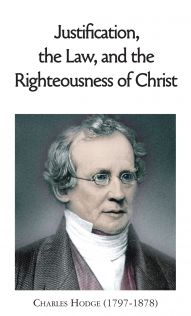 by Charles Hodge
by Charles Hodge
In ePub, mobi and .pdf formats
HT: Chapel Library
How can a man be just with God? The answer given to this question decides the character of our religion and, if practically adopted, our future destiny. To give a wrong answer is to mistake the way to heaven. It is to err where error is fatal, because it cannot be corrected. If God requires one thing and we present another, how can we be saved? If He has revealed a method in which He can be just and yet justify the sinner, and if we reject that method and insist upon pursuing a different way, how can we hope to be accepted? The answer, therefore, that is given to the above question should be seriously pondered by all who assume the office of religious teachers and by all who rely upon their instructions.
As we are not to be judged by proxy,1 but every man must answer for himself, so every man should be satisfied for himself what the Bible teaches on this subject. All that religious teachers can do is to endeavor to aid the investigations of those who are anxious to learn the way of life. And in doing this, the safest method is to adhere strictly to the instructions of the Scriptures and to exhibit the subject as it is there presented. The substance and the form of this all important doctrine are so intimately connected that those who attempt to separate them can hardly fail to err. What one discards as belonging merely to the form, another considers as belonging to its substance.
All certainty and security are lost as soon as this method is adopted and it becomes a matter to be decided exclusively by our own views of right and wrong: what is to be retained and what rejected from the scriptural representations. Our only security, therefore, is to take the language of the Bible in its obvious meaning and put upon it the construction that the persons to whom it was addressed must have given and that, consequently, the sacred writers intended it should bear.
As the doctrine of justification is not only frequently stated in the sacred Scriptures but formally taught and vindicated,2 all that will be attempted in this [article] is to give as faithfully as possible a representation of what the inspired writers inculcate3 on this subject; that is, to state:
- what positions they assume,
- by what arguments they sustain those positions,
- how they answer the objections to their doctrine, and
- what application they make of it to the hearts and consciences of their readers.
TABLE OF CONTENTS
I. The Meaning of Justification
A. Introduction
B. Terms of the Law
II. How Righteousness Is Obtained
A. Justification Not by Works
B. Freedom from law-keeping for acceptance
III. Christ’s Satisfaction of the Law
A. Substitution
B. The Testimony of All Scripture
IV. Extension to the Believer
A. The Believer “in Christ”
B. How Christ’s Death Secures Pardon
V. The Righteousness of Christ
VI. Applications of This Doctrine
A. The Love of God
B. Honor to God
C. The Necessities of Man
D. Conclusion
Questions for Personal Study and Group Discussion
